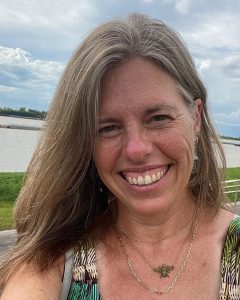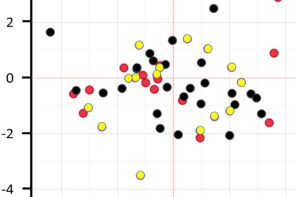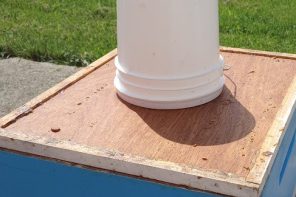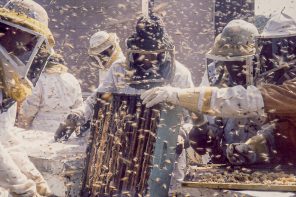
Dr. Bilodeau
Lelania Bilodeau, PhD
By: Earl Hoffman
Dr. Bilodeau, thank you for agreeing to this Bee Culture Magazine interview. I understand that you go by Lanie because it is easier to pronounce. Let me just use Lanie, it will be easier for me too.
Lanie, please share some of your background and tell us why you became a beekeeper.
Honey bees are fascinating, it’s wonderful to work with these fantastic insects.
I started working with honey bees in 2006. My original academic work was in Maryland with a Bachelors and Masters degrees in biology, Towson State University. I earned my Ph.D. degree, University of Louisiana at Lafeyette in 2000. I am the first in my family to be a beekeeper.
I am so very happy to be working here at the USDA – ARS Baton Rouge Bee Laboratory, we have a great team here.
I have always liked honey bees. I’m now the Research Leader/Location Coordinator here at the honey bee lab.
What is your passion about honey bees and beekeeping? What motivates you?
I’m motivated to have a positive impact for our honey bees and beekeepers. My passion for bees centers around the strategies bees use to fight off disease and to overcome other stresses. I want to enhance their ability to use those tools through breeding.
How many years have you been with bees and how many beehives do you and your team run?
I have worked with bees since 2006, so 16 years. I did not work honey bees during my childhood. Each year I learn more about the bees. My connection is leading my team to improve honey bee health through breeding. We have roughly 900 hives at the Baton Rouge lab.
I understand you also work with commercial beekeepers, what have you learned from that experience?
Working with commercial beekeepers has helped me gain perspective on the needs of the beekeeping industry and appreciation of the scale of their needs. That helps us stay grounded and keep our work focused on having impact not only on honey bee health, but on the beekeeping industry.
Since you’re a honey bee scientist, tell us about some of the experiments you have done with honey bees.
I developed a pathogen detection assay to distinguish and quantify Nosema ceranae and Nosema apis, and a sampling method to avoid external contamination of bees.
I helped to characterize complementary sex-determiner allele profiles for the Pol-line and Hilo honey bee stocks, for use in breeding decisions. I also developed a global nomenclature system for complementary sex-determiner alleles in honey bees.
I characterized the genetics of the Russian honey bee stock and developed a stock identification assay using genetic finger print markers. This helps in the certification program of the Russian Honey Bee Breeders Association.
I have identified genes that are tied to traits that help bees resist the varroa mite. These genes are being developed for use in breeding.
Our nemesis the Varroa mite, Lanie, please explain your thoughts on Varroa mites.
Varroa mites are a big problem in the industry, as you know. Our goal is to breed bees and develop a resistant stock for the beekeepers to use. We are making good progress, and working on issues related to varroa from lots of angles. We are documenting amitraz resistance in mites and developing management strategies to combat this. We are also developing edible vaccines for the viruses that varroa mites vector and breeding bees that are resistant to virus infections and have high resilience.
I believe you have experience with Apis mellifera scutellata, the African bee, tell us more please.
Currently, Apis mellifera scutellata is not an issue in Louisiana. We have completed work here at the bee lab to define defensive behavior markers. I worked with Australia to screen for africanized bees.
How do you include your family and friends in your beekeeping journey?
My family always asks “how are the bees?” My children do visit the honey bee lab. My daughter developed a science fair project (a nosema study) that was very successful in competition. She came in second place in the Louisiana State Science Fair. She is studying to become a high school biology teacher.
Lanie, what is the most important thing you have learned so far about honey bees?
That teamwork is the key to thriving!
Which classes on beekeeping have you taken so far, Lanie?
The technicians here at the honey bee lab are fantastic. I have learned most of what I know about beekeeping from them. Its been a great journey.
I understand you attend many different beekeeping industry conferences, tell us more!
I attend the yearly conferences of the Louisiana Beekeepers Association, Mississippi Beekeepers Association and ABF or AHPA as often as I am able. There is always so much to learn and share at these conferences. They are a great opportunity to talk to beekeepers and connect with the Industry.
Lanie, you have experience with different races of bees, what types and why?
We have several stocks of honey bees that we manage and use in our research and breeding work. Some of them are Italian, POL line, Hilo, Saskatraz and Russian. We compare stocks of bees in much of our research.
Since you’re not a migratory beekeeper, how do you overwinter honey bees in Baton Rouge, Louisiana?
We leave honey in the Winter for our hives and supplement their feed when needed, using pollen patties and sugar syrup. We are working with microalgae as an alternative nutritional source. We are also assessing the affects of cold storage in buildings in Russian honey bees.
Please tell us how you captured your first swarm of honey bees?
I, myself, have not captured a swarm. Here at the Honey Bee Lab, when our bees swarm, we catch them.
What is your greatest success in your beekeeping journey?
I can say that the Nosema assay and the Russian bee genetic stock identification have been a big success.
What is your greatest challenge in your beekeeping journey?
Trying to breed bees that are resistant to Nosema ceranae. We tried to develop Nosema resistance for two years, but did not have success. Nosema is so variable that is a bear to deal with.
Lanie, last question: What are your goals for the next five (5) years? With your bees and your bee journey?
I hope that in the next five (5) years we will be close to releasing our next stock. We are working to enhance multiple traits. We desire to expand our world class research programs here at USDA. We are always looking for ways to collaborate with other research groups. Last, we hope to have more interviews with our fantastic team here at the Baton Rouge Honey Bee Lab. There is a lot of opportunity here.
Thank you so very much Dr. Bilodeau for taking the time to share your bee journey with Bee Culture Magazine. It was wonderful speaking to you.








